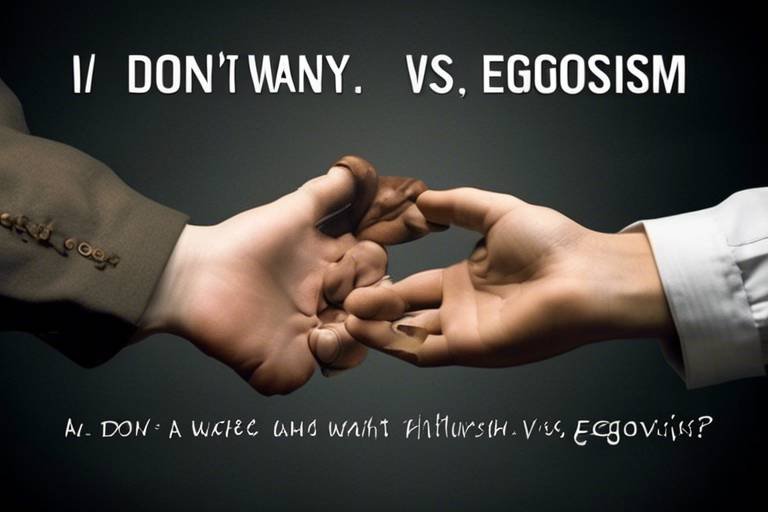Altruism vs. Egoism - A Philosophical Analysis
In the grand tapestry of human behavior, the threads of altruism and egoism weave a complex narrative that has intrigued philosophers, psychologists, and everyday individuals alike. These two concepts often appear as opposites, yet they share a fascinating interplay that reflects the dual nature of humanity. Understanding these terms is not just an academic exercise; it is a journey into the very essence of what it means to be human. Are we truly selfless beings, or are our good deeds merely veiled attempts to fulfill our own desires? This article delves into the philosophical underpinnings of altruism and egoism, exploring their definitions, implications, and the ongoing debates that surround them.
Altruism is often described as the selfless concern for the well-being of others, a notion that has deep philosophical roots. The term itself derives from the Latin word "alter," meaning "other," suggesting a focus beyond oneself. Throughout history, various thinkers have championed altruism, emphasizing its moral significance. For instance, the writings of August Comte in the 19th century laid the groundwork for altruistic philosophy, arguing that society should prioritize the welfare of others. In contemporary times, we witness altruism manifesting in numerous forms, from charitable acts to social movements aimed at improving the lives of the marginalized. But what drives this selflessness? Is it innate, or is it cultivated through societal norms? These questions invite us to reflect on the motivations behind altruistic behavior and its impact on our communities.
In stark contrast, egoism posits that individuals act primarily in their own self-interest. This philosophy suggests that self-preservation and personal gain are the driving forces behind human actions. There are different forms of egoism, including ethical egoism and psychological egoism, each providing a unique lens through which to view human motivation. Ethical egoism argues that actions are morally right if they promote one's own best interests, while psychological egoism claims that humans are inherently self-interested. This raises a critical question: can we truly separate altruistic acts from self-serving motives? As we explore these concepts, we uncover the nuances that define our interactions and relationships.
Ethical egoism presents a compelling argument: actions are morally justified if they benefit oneself. This perspective challenges traditional moral frameworks that prioritize the welfare of others. Proponents of ethical egoism argue that by focusing on self-interest, individuals can create a more honest and authentic society. However, this theory is not without its critiques. Detractors argue that ethical egoism can lead to a breakdown of trust and community, as individuals prioritize their own desires over collective well-being. The implications of ethical egoism extend into our interpersonal relationships, raising questions about the morality of our actions and the potential harm they may cause to others.
Critics of ethical egoism often highlight its potential to justify harmful actions. If everyone acts solely in their self-interest, what happens to compassion and empathy? The moral dilemmas arise when self-interest conflicts with the needs of others. For instance, consider a scenario where a business owner prioritizes profit over employee welfare. This raises ethical questions: is it acceptable to sacrifice the well-being of others for personal gain? The critiques of ethical egoism underscore the importance of finding a balance between self-interest and altruism in our decision-making processes.
Despite the criticisms, supporters of ethical egoism argue that it can lead to a more honest society. By encouraging individuals to prioritize their own interests, ethical egoism can foster a sense of responsibility for one’s actions. This perspective suggests that when people act in their own best interests, they are more likely to contribute positively to society in the long run. For example, a successful entrepreneur may create jobs and stimulate economic growth while pursuing personal financial gain. Thus, ethical egoism presents a complex interplay between self-interest and societal benefit.
Psychological egoism takes a different approach by asserting that humans are inherently self-interested. This theory posits that even seemingly altruistic actions are motivated by a desire for personal fulfillment or social approval. For instance, when someone donates to charity, they may derive a sense of satisfaction or recognition from their generosity. This raises the question: can we ever truly act selflessly? Investigating the evidence supporting psychological egoism reveals insights into human motivation, challenging us to reconsider the nature of our actions and the underlying drives that shape them.
As we navigate the landscape of altruism and egoism, it becomes evident that these concepts are not mutually exclusive. In fact, they often coexist in a dynamic relationship. For instance, consider the scenario where an individual volunteers at a local shelter. While their actions may appear altruistic, they could also be motivated by a desire to enhance their social standing or personal fulfillment. This interplay highlights the complexity of human motivations, suggesting that self-interest and concern for others can coexist in a delicate balance.
Some argue that altruistic actions can ultimately serve self-interest. This perspective suggests that helping others can enhance one’s own well-being and social standing. For example, individuals who engage in charitable acts often experience a boost in mood and self-esteem. This raises an intriguing question: can altruism be viewed as a form of egoism? By examining the motivations behind our actions, we can gain a deeper understanding of how self-interest and altruism intertwine in our lives.
To illustrate the dynamic between altruism and egoism, consider the following case studies:
| Case Study | Description | Altruistic Elements | Egoistic Elements |
|---|---|---|---|
| Volunteer Work | A person dedicates time to help at a local food bank. | Helping those in need. | Gaining social recognition. |
| Philanthropy | A wealthy individual donates to a university. | Supporting education. | Enhancing personal reputation. |
| Environmental Activism | Joining a campaign to combat climate change. | Protecting the planet. | Feeling good about one’s contributions. |
These case studies illustrate how individuals navigate the philosophical concepts of altruism and egoism in their daily lives, often embodying both principles simultaneously. As we continue to explore these ideas, we gain valuable insights into the motivations that drive human behavior.
- What is the difference between altruism and egoism?
Altruism focuses on the well-being of others, while egoism emphasizes self-interest. - Can altruism and egoism coexist?
Yes, individuals often exhibit both altruistic and egoistic behaviors in their actions. - Is ethical egoism a valid moral philosophy?
While it has its proponents, ethical egoism faces significant criticism for potentially justifying harmful actions. - What role does psychological egoism play in understanding human behavior?
Psychological egoism suggests that all human actions are motivated by self-interest, challenging the notion of true altruism.

Defining Altruism
Altruism, at its core, is the selfless concern for the well-being of others. It's a concept that has intrigued philosophers, psychologists, and everyday people alike for centuries. Imagine standing in a crowded room and witnessing someone in distress. The instinct to help, to put their needs before your own, is what altruism embodies. This selfless act can be seen as a moral compass guiding us toward compassion and empathy. But where did this idea originate, and how has it evolved over time?
The philosophical roots of altruism can be traced back to various cultures and thinkers. For instance, the ancient Greeks, particularly in the works of Socrates and Plato, emphasized the importance of virtue and the greater good. In their view, true happiness comes not from self-indulgence but from serving others. Fast forward to the 19th century, and we find Auguste Comte, who coined the term 'altruism' itself, advocating for a moral framework centered on the welfare of others. He believed that a society thrives when individuals prioritize the needs of the community over their own desires.
Altruism manifests in various forms, from small acts of kindness, like helping a neighbor carry groceries, to grand gestures, such as dedicating one’s life to humanitarian efforts. The beauty of altruism lies in its universality; it transcends cultural and geographical boundaries. Whether through volunteer work, charitable donations, or simply offering emotional support, altruistic behavior can take many shapes. Here are a few key examples:
- Volunteering: Many individuals dedicate their time to help those in need, whether in shelters, hospitals, or community centers.
- Philanthropy: Wealthy individuals often donate substantial amounts to causes they believe in, aiming to improve society.
- Acts of kindness: Simple gestures, such as holding the door open for someone or offering a listening ear, can have profound impacts.
However, altruism is not without its complexities. Some argue that altruistic actions may sometimes stem from a desire for social approval or to alleviate personal guilt. This brings us to a fascinating debate: Is any act truly selfless, or is there always an element of self-interest involved? This question opens the door to a deeper understanding of human psychology and motivation.
In contemporary society, altruism continues to play a crucial role. With the rise of social media, acts of kindness can be shared and celebrated on a global scale, inspiring others to follow suit. Yet, this also raises questions about the authenticity of these actions. Are people genuinely motivated by a desire to help, or are they seeking validation and recognition? As we navigate these waters, it becomes essential to reflect on our motivations and the impact of our actions on others.
In conclusion, altruism is a multifaceted concept that reflects the best of human nature. It challenges us to look beyond ourselves and consider the needs of others. Whether through historical perspectives or modern-day practices, altruism remains a vital force in shaping a compassionate society. As we explore the interplay between altruism and egoism in the following sections, we will uncover the intricate dance between self-interest and selflessness that defines our human experience.

Understanding Egoism
Egoism is a philosophical concept that asserts individuals primarily act in their own self-interest. It’s a perspective that can be both liberating and controversial, as it challenges the notion of altruism—the idea that we should act for the benefit of others. At its core, egoism suggests that self-interest is not just a natural human inclination but also a valid ethical stance. This raises important questions about morality and motivation: Can we truly separate our desires from our actions? And if we act to benefit ourselves, does that diminish the value of our actions towards others?
There are several forms of egoism that deserve attention, notably ethical egoism and psychological egoism. Ethical egoism posits that actions are morally right if they promote one's own best interests, while psychological egoism suggests that humans are inherently self-interested, regardless of their intentions. This creates a fascinating dichotomy: Are our actions genuinely altruistic, or are they simply veiled attempts to serve our own needs? The implications of these theories extend beyond philosophy and into our everyday interactions, shaping our understanding of human behavior in profound ways.
To illustrate the nuances of egoism, let’s take a closer look at its two main branches:
| Type of Egoism | Description |
|---|---|
| Ethical Egoism | Argues that individuals should act in ways that promote their own interests, suggesting that this is morally acceptable. |
| Psychological Egoism | Claims that all human actions are motivated by self-interest, even those that appear altruistic. |
Understanding these distinctions is crucial in navigating the complex landscape of human motivations. For instance, ethical egoism can lead to a more honest society where individuals are upfront about their intentions, but it can also create moral dilemmas. If everyone acts solely in their own interest, what happens to the fabric of community and cooperation? Critics argue that this could justify harmful actions, as individuals might prioritize their own needs over the well-being of others. Conversely, proponents of ethical egoism contend that it encourages personal responsibility and accountability.
On the other hand, psychological egoism raises an intriguing point about the nature of human motivation. If we are indeed wired to act in self-interest, does that mean altruism is merely a façade? This perspective can feel disheartening, as it suggests that our most noble acts are tainted by selfish motives. However, it also opens the door to a deeper understanding of human behavior. Perhaps our actions, while motivated by self-interest, can still have positive outcomes for others. This interplay between self-interest and altruism is a rich area for exploration, challenging us to reconsider our assumptions about what it means to be good.
In summary, egoism presents a compelling framework for understanding human behavior, one that invites us to reflect on our motivations and the ethical implications of our actions. As we navigate through life, the balance between self-interest and altruism remains a dynamic tension, prompting us to ask: How do we define our actions in a world where both egoism and altruism coexist?
- What is the main difference between ethical and psychological egoism?
Ethical egoism focuses on what individuals ought to do, while psychological egoism describes what individuals actually do, suggesting that all actions are motivated by self-interest. - Can altruistic actions be motivated by self-interest?
Yes, some argue that even altruistic actions can serve self-interest, enhancing one's well-being or social standing. - What are the implications of egoism in society?
Egoism can lead to a more honest society but may also foster a lack of community and cooperation if everyone prioritizes their own interests.

Ethical Egoism
Ethical egoism is a fascinating philosophical stance that argues that individuals ought to act in their own self-interest. This theory posits that the moral rightness of an action is determined by how well it promotes one's own best interests. Imagine a world where every decision you make is rooted in the desire to enhance your own well-being—sounds a bit selfish, doesn’t it? Yet, ethical egoists assert that this self-centered approach can lead to a more harmonious society overall.
One of the most compelling aspects of ethical egoism is its bold assertion that self-interest is not only a natural human tendency but also a moral imperative. Think about it: when you prioritize your own needs, you’re not just looking out for yourself; you’re also setting a standard for others to follow. In this light, ethical egoism can be perceived as a call to embrace personal responsibility and authenticity. After all, when you are true to yourself, you are more likely to contribute positively to the community around you.
However, the implications of ethical egoism are not without controversy. Critics argue that this philosophy can lead to a range of moral dilemmas. For instance, if everyone acted solely out of self-interest, could society function effectively? Would compassion and cooperation be sacrificed at the altar of personal gain? To illustrate this point, consider the following scenarios:
- A business owner who prioritizes profit over employee welfare may succeed financially but could foster a toxic work environment.
- An individual who refuses to donate to charity, believing that their resources are better spent on personal luxuries, may miss out on the joy that comes from helping others.
These examples highlight the potential pitfalls of ethical egoism, suggesting that while pursuing one's own interests is important, it should not come at the expense of others. Critics often contend that ethical egoism can justify harmful actions, leading to a society where exploitation and greed are rampant. This raises the question: can a philosophy that promotes self-interest truly coexist with the values of empathy and altruism?
Despite these critiques, proponents of ethical egoism argue that it can lead to a more honest society. They contend that when individuals act in their own best interests, they are more likely to engage in transparent and fair dealings. This perspective posits that ethical egoism encourages people to be straightforward about their motivations, reducing the likelihood of deceitful behavior. In this way, ethical egoism could foster a climate of trust, where individuals acknowledge their self-interest while still considering the impact of their actions on others.
In conclusion, ethical egoism presents a thought-provoking view on morality and human behavior. By advocating for self-interest as a guiding principle, it challenges traditional notions of altruism and raises important questions about the nature of ethical decision-making. As we navigate the complexities of our lives, understanding the nuances of ethical egoism can help us find a balance between self-care and social responsibility.

Critiques of Ethical Egoism
Ethical egoism, while presenting a seemingly rational approach to morality by prioritizing self-interest, has faced significant critiques that challenge its validity and ethical implications. One of the primary criticisms is that it can lead to a justification of harmful actions. When individuals are encouraged to act solely in their own best interests, it raises the question: what happens to the well-being of others? For instance, if a person chooses to exploit a colleague for personal gain, ethical egoism would deem this behavior acceptable, as it serves the individual's interests. This perspective can foster a culture of selfishness, where compassion and empathy are sidelined.
Moreover, ethical egoism is often critiqued for its inability to resolve moral dilemmas effectively. Imagine a scenario where two people need the same job position. An ethical egoist would advocate for the individual who is most self-serving in their approach. This raises a moral quandary: how do we balance our interests with the needs of others? Critics argue that ethical egoism fails to provide a satisfactory answer to this question, leading to potential conflicts and a breakdown of social cohesion.
Another significant concern is the potential for ethical egoism to undermine trust in interpersonal relationships. Trust is a foundational element of any healthy relationship, whether personal or professional. If individuals adopt an ethical egoist stance, they may view relationships as transactional, where the primary goal is personal gain. This perspective can create an environment of suspicion and competition rather than collaboration and support. In essence, ethical egoism can erode the very bonds that hold society together.
Furthermore, ethical egoism is often criticized for its narrow view of human motivation. While it posits that individuals act out of self-interest, many argue that human behavior is more complex and multifaceted. People are often motivated by a blend of altruistic and egoistic desires. For instance, someone may volunteer at a shelter not only to help those in need but also to feel a sense of fulfillment and purpose. This interplay of motivations challenges the premise of ethical egoism and suggests that a more nuanced understanding of human behavior is necessary.
In summary, while ethical egoism promotes self-interest as a guiding principle, its critiques highlight significant ethical dilemmas, potential harm to societal structures, and a simplistic view of human motivation. As we continue to navigate the complexities of ethical decision-making, these critiques serve as a reminder of the importance of considering the broader impact of our actions on others.
- What is ethical egoism? Ethical egoism is the theory that individuals should act in their own self-interest, and that such actions are morally right.
- What are the main critiques of ethical egoism? Critics argue that it can justify harmful actions, create moral dilemmas, undermine trust in relationships, and oversimplify human motivations.
- How does ethical egoism differ from psychological egoism? Ethical egoism is a prescriptive theory about how people ought to act, while psychological egoism is a descriptive theory about how people actually behave.
- Can altruism and egoism coexist? Yes, many argue that altruistic actions can also serve self-interest, creating a complex interplay between the two concepts.

Support for Ethical Egoism
Despite the criticisms that ethical egoism often faces, there are compelling arguments that advocate for its validity and potential benefits in society. One of the primary supports for ethical egoism is the notion that it encourages individuals to take responsibility for their own lives. By prioritizing their own interests, individuals may become more self-reliant, fostering a sense of autonomy that can lead to greater personal fulfillment. This self-focus can be likened to the practice of putting on one's own oxygen mask before assisting others in an airplane emergency; it emphasizes the importance of self-care as a precursor to being able to help others effectively.
Moreover, ethical egoism can promote honesty and transparency in social interactions. When individuals act in their own self-interest, they may be more inclined to communicate openly about their needs and desires. This openness can lead to healthier relationships, as both parties understand each other's motivations and goals. In contrast, altruistic behavior, which often masks true intentions, can sometimes result in misunderstandings and resentment.
Another argument in favor of ethical egoism is its alignment with human nature. Proponents suggest that since humans are inherently self-interested, it is unrealistic to expect people to consistently act against their own interests. Ethical egoism acknowledges this reality and encourages individuals to embrace their natural inclinations. This acceptance can lead to a more authentic existence, where people are not burdened by guilt for pursuing their own happiness.
Furthermore, ethical egoism can stimulate economic growth and innovation. When individuals are motivated by their own interests, they are more likely to take risks and invest in new ideas. This drive for personal gain can lead to advancements that benefit society as a whole. For instance, entrepreneurs who pursue their own financial success often create jobs and contribute to the economy, demonstrating that self-interest can have far-reaching positive effects.
In summary, while ethical egoism may seem controversial, its supporters argue that it fosters personal responsibility, promotes honesty, aligns with human nature, and drives economic progress. By understanding and embracing our self-interests, we might not only enhance our own lives but also contribute positively to the world around us.
- What is ethical egoism? Ethical egoism is the philosophical theory that suggests actions are morally right if they promote one's own best interests.
- How does ethical egoism differ from altruism? While ethical egoism focuses on self-interest, altruism emphasizes selfless concern for the well-being of others.
- Can ethical egoism lead to positive social outcomes? Yes, proponents argue that ethical egoism can foster honesty and responsibility, ultimately benefiting society.
- Are there criticisms of ethical egoism? Yes, critics argue that it can justify harmful actions and create moral dilemmas in interpersonal relationships.

Psychological Egoism
Psychological egoism is a fascinating theory that suggests humans are fundamentally driven by self-interest. Imagine walking into a crowded room; as you scan the faces, you might notice that every smile, every gesture, and even every act of kindness could be rooted in a desire for personal gain. This perspective posits that even our most altruistic actions are ultimately motivated by a hidden agenda—whether that’s seeking approval, avoiding guilt, or enhancing one’s reputation. It’s a bit like peeling an onion; the more layers you remove, the more you realize that self-interest often lurks beneath the surface of our seemingly selfless deeds.
One of the key proponents of psychological egoism was the philosopher Thomas Hobbes, who famously argued that humans are naturally inclined to act in their own self-interest. Hobbes believed that in a state of nature, individuals would prioritize their own survival and well-being above all else. This perspective can be unsettling, as it challenges our assumptions about the purity of human motives. However, it also opens up a rich dialogue about the nature of morality and the complexities of human behavior.
Critics of psychological egoism argue that this theory oversimplifies human motivations and overlooks the genuine empathy and compassion that people can exhibit. They contend that while self-interest can play a role in many decisions, it doesn’t account for the full spectrum of human emotions and moral obligations. For instance, consider a parent who sacrifices their own comfort to ensure their child’s happiness. Is this act purely self-interested, or does it reflect a deeper, more altruistic love? This debate emphasizes the need to explore the nuances of human behavior and the intricate interplay between self-interest and altruism.
To better understand psychological egoism, let’s examine some common arguments that support this viewpoint:
- Innate Survival Instincts: Many psychologists argue that the drive for self-preservation is an inherent part of human nature, influencing our decisions and actions.
- Social Exchange Theory: This theory posits that human relationships are based on a cost-benefit analysis, where individuals seek to maximize rewards and minimize costs.
- Empirical Evidence: Studies in behavioral psychology often reveal patterns where individuals engage in altruistic behavior primarily for personal satisfaction or social recognition.
Despite these arguments, it’s essential to consider the counterarguments and the evidence that suggests humans can act against their self-interest. For example, numerous studies have shown that people can prioritize the needs of others over their own, often at significant personal cost. This raises the question: can we truly accept that all human behavior is rooted in self-interest?
Ultimately, psychological egoism invites us to reflect on our motivations and the nature of our actions. It challenges us to think critically about the reasons behind our choices and the extent to which self-interest influences our relationships and society. By recognizing the potential for self-interest in our actions, we might also find a deeper appreciation for the moments when we step outside of ourselves to help others, creating a more complex and nuanced understanding of what it means to be human.

The Interplay Between Altruism and Egoism
When we dive into the philosophical ocean of altruism and egoism, it’s easy to think of them as two opposing forces, like the sun and the moon battling for dominance in the sky. However, the reality is far more nuanced. Altruism and egoism can coalesce, creating a fascinating interplay that defines much of human behavior. Have you ever noticed how helping others can sometimes make you feel good about yourself? That’s the beauty of this complex relationship.
At first glance, altruism seems to be the champion of selflessness, while egoism wears the badge of self-interest. But what if I told you that these two concepts can actually complement each other? Picture a scenario where a person donates to charity. On one hand, they are acting out of a genuine desire to help those in need, embodying altruism. On the other hand, they may also experience a boost in their social status or personal satisfaction, which aligns with egoistic motivations. This duality raises some interesting questions: Can an act of kindness truly be selfless if it brings personal joy? Is it possible that our altruistic impulses are simply a reflection of our egoistic desires?
To better understand this interplay, let’s explore a few scenarios where altruism and egoism not only coexist but also enhance each other:
- Community Service: Volunteering at a local shelter may stem from a desire to help others, yet it can also provide networking opportunities and a sense of belonging.
- Acts of Kindness: Simple gestures, like helping a neighbor, may be motivated by a genuine concern, but they can also strengthen social bonds and improve one’s reputation.
- Charitable Giving: Donating money to a good cause can be a selfless act, but it may also come with tax benefits or increase one's social capital.
These examples illustrate that altruistic actions often have an egoistic undercurrent. This doesn’t necessarily diminish the value of the altruistic act; rather, it highlights the complexity of human motivations. Just as a river flows with multiple currents, our actions can be influenced by a blend of altruistic and egoistic impulses.
Furthermore, the relationship between altruism and egoism can be seen in broader societal contexts. For instance, many businesses today are adopting corporate social responsibility (CSR) practices. While these initiatives aim to benefit society, they also enhance the company’s image and profitability. This interplay suggests that altruism can be a strategic choice, blurring the lines between selfless and self-serving motives.
In essence, the dance between altruism and egoism is not a battle; it’s a partnership. By recognizing that our self-interest can coexist with a genuine concern for others, we can foster a more compassionate society. This nuanced understanding encourages us to embrace our complexities rather than view them as contradictions. So, the next time you lend a helping hand, remember that it’s perfectly okay to feel good about it!
- Can altruism exist without egoism? While many acts of altruism may appear selfless, it’s challenging to find a purely altruistic act devoid of any personal benefit or satisfaction.
- Is egoism always negative? Not necessarily. Ethical egoism, for instance, can promote honesty and authenticity in society, encouraging individuals to act in their own best interests while respecting others.
- How can understanding this interplay improve relationships? Recognizing that both altruistic and egoistic motives can coexist can lead to more empathetic interactions, as individuals appreciate the complexity of each other's motivations.

Altruism as a Form of Egoism
When we think about altruism, the image of a selfless act often comes to mind—someone donating to charity, volunteering at a shelter, or helping a stranger in need. But what if I told you that these seemingly selfless acts might also serve a hidden purpose? This is where the concept of altruism as a form of egoism comes into play. It challenges the traditional notion that altruism is purely about the well-being of others, suggesting that even our most generous actions can be intertwined with self-interest.
Consider this: when you help someone, it often feels good. That warm, fuzzy feeling you get is not just a byproduct of your good deeds; it’s a psychological reward that reinforces your behavior. Some philosophers argue that this is not merely a coincidence but a fundamental aspect of human nature. In fact, altruistic actions can enhance one's social standing, strengthen relationships, and even contribute to a sense of personal fulfillment. Thus, the line between altruism and egoism becomes blurred.
To illustrate this point further, let’s look at a few scenarios where altruism and egoism intersect:
- Community Service: Volunteering not only helps those in need but can also improve your reputation within the community, leading to social recognition.
- Acts of Kindness: Helping a friend in distress can deepen your bond, ultimately benefiting you emotionally and socially.
- Charitable Donations: Donating to charity can provide tax benefits, making it a financially savvy choice while also supporting a good cause.
In these examples, the altruistic act does not negate the potential personal benefits that come from it. Instead, it highlights the complex motivations behind why we do what we do. This interplay suggests that perhaps our instincts to help others are not entirely selfless; rather, they are also driven by an innate desire for personal gain—be it emotional, social, or even financial.
Moreover, this perspective aligns with the principles of evolutionary psychology, which posits that behaviors promoting the welfare of others can ultimately serve to enhance one’s own survival and reproductive success. When we help others, we create a network of support that can be vital in times of need. In a way, altruism becomes a strategy for ensuring our own well-being in a community context.
However, it’s important to note that not everyone subscribes to this viewpoint. Critics argue that reducing altruism to mere self-interest undermines the genuine compassion that motivates many to act selflessly. They believe that while there may be benefits to altruistic behavior, the true essence of altruism lies in the desire to help others without any expectation of reward. This ongoing debate raises thought-provoking questions about human nature and the motivations behind our actions.
In conclusion, the idea that altruism can be a form of egoism invites us to reconsider our understanding of human behavior. It suggests that our motivations are often more complex than they appear on the surface. By recognizing this interplay, we can gain deeper insights into our actions and the social dynamics that shape our lives. So, the next time you lend a helping hand, take a moment to reflect: is it purely for the benefit of others, or is there a little bit of self-interest at play?
1. Can altruism exist without any form of self-interest?
Many philosophers argue that while altruism can be motivated by self-interest, it does not completely negate the possibility of selfless acts. True altruism may exist, but it is often intertwined with other motivations.
2. How can understanding altruism as egoism change our perspective on helping others?
Recognizing that altruistic acts may also serve our self-interest can help us appreciate the complexity of human motivations and encourage a more nuanced approach to social interactions.
3. Are there any psychological benefits to altruism?
Yes, engaging in altruistic behavior can lead to improved mental health, increased happiness, and a stronger sense of community, reinforcing the idea that helping others can also be beneficial to oneself.

Case Studies in Altruism and Egoism
To truly understand the intricate dance between altruism and egoism, we can look at real-world examples that illustrate how these two philosophies manifest in everyday life. One compelling case is that of a firefighter who risks his life to save a stranger from a burning building. At first glance, this act appears to be entirely altruistic, driven by a selfless desire to protect another human being. However, if we dig a little deeper, we might wonder: is there an element of egoism at play here? Perhaps the firefighter feels a sense of duty, pride, or even the desire for recognition. This blurs the lines between altruism and egoism, showcasing how intertwined these motivations can be.
Another fascinating example can be found in the realm of philanthropy. Consider a wealthy entrepreneur who donates millions to charity. On one hand, this act can be seen as a pure expression of altruism, aimed at improving the lives of others. Yet, many argue that such donations also serve the donor's self-interest. After all, charitable contributions can enhance one's public image, lead to tax benefits, and create a legacy that may be remembered long after the donor is gone. This raises the question: can altruism ever be entirely free from egoistic motives?
In the world of business, we see a similar interplay. Companies often engage in corporate social responsibility (CSR) initiatives, promoting sustainable practices and community engagement. While these actions can significantly benefit society, they also help enhance the company's brand reputation and attract customers who value ethical practices. This duality prompts us to consider whether altruistic actions in business are genuinely selfless or cleverly disguised strategies for profit.
To further illustrate this complex relationship, let’s examine a few specific case studies:
| Case Study | Altruistic Actions | Egoistic Motivations |
|---|---|---|
| Firefighter Saving a Stranger | Risking life to save another | Sense of duty, potential recognition |
| Philanthropist Donating to Charity | Financial support for social causes | Tax benefits, improved public image |
| Company Engaging in CSR | Community development projects | Brand enhancement, customer loyalty |
These case studies reveal that altruism and egoism are not mutually exclusive; rather, they often coexist in a complex relationship that defines human behavior. The motivations behind our actions can be multifaceted, and understanding this interplay is crucial for grasping the full scope of human nature. So, the next time you witness an act of kindness, take a moment to ponder: is it purely altruistic, or is there a hidden layer of self-interest?
- What is the difference between altruism and egoism? Altruism is the selfless concern for the well-being of others, while egoism is the principle that individuals act primarily in their own self-interest.
- Can altruistic actions be motivated by self-interest? Yes, many argue that altruistic actions can also serve self-interest, such as enhancing one’s reputation or fulfilling a personal obligation.
- Are there any philosophical theories that combine both concepts? Yes, some philosophies suggest that altruism and egoism can coexist and that self-interested actions can lead to altruistic outcomes.
- How do case studies help in understanding these concepts? Case studies provide real-world examples that illustrate the complexities and nuances of altruism and egoism, showing how they can manifest in various situations.
Frequently Asked Questions
- What is altruism?
Altruism refers to the selfless concern for the well-being of others. It's the idea that one can act out of a genuine desire to help, without expecting anything in return. Think of it as being the superhero of kindness, always ready to lend a hand!
- How does egoism differ from altruism?
Egoism is the belief that individuals primarily act in their own self-interest. While altruism focuses on others, egoism is all about the "me." Imagine a person who only helps others to boost their own reputation; that's a classic case of egoism!
- What is ethical egoism?
Ethical egoism is a theory that suggests actions are morally right if they promote one's own best interests. It's like saying, "If it benefits me, then it's good!" However, this perspective often faces criticism for potentially justifying selfish or harmful actions.
- Can altruistic actions serve self-interest?
Absolutely! Some argue that acts of kindness can enhance one's own well-being and social standing. Helping others can create a sense of fulfillment and strengthen relationships, making it a win-win situation!
- What are the critiques of ethical egoism?
Critics argue that ethical egoism can lead to justifying harmful actions and creates moral dilemmas in relationships. If everyone acted solely in their self-interest, it could undermine trust and cooperation in society.
- What is psychological egoism?
Psychological egoism claims that humans are inherently self-interested. This theory suggests that even our seemingly altruistic actions are motivated by personal gain, like feeling good about ourselves after helping someone.
- How do altruism and egoism coexist?
Altruism and egoism can actually complement each other. Sometimes, acting in one's self-interest can lead to altruistic behavior, and vice versa. It’s a complex dance of motivations that reflects the multifaceted nature of human behavior.
- Can you provide examples of altruism and egoism in real life?
Sure! A classic example of altruism is volunteering at a homeless shelter without any expectation of reward. On the other hand, someone might donate to charity to improve their public image, showcasing an egoistic motive. Both actions highlight the intricate interplay between these philosophies.



















